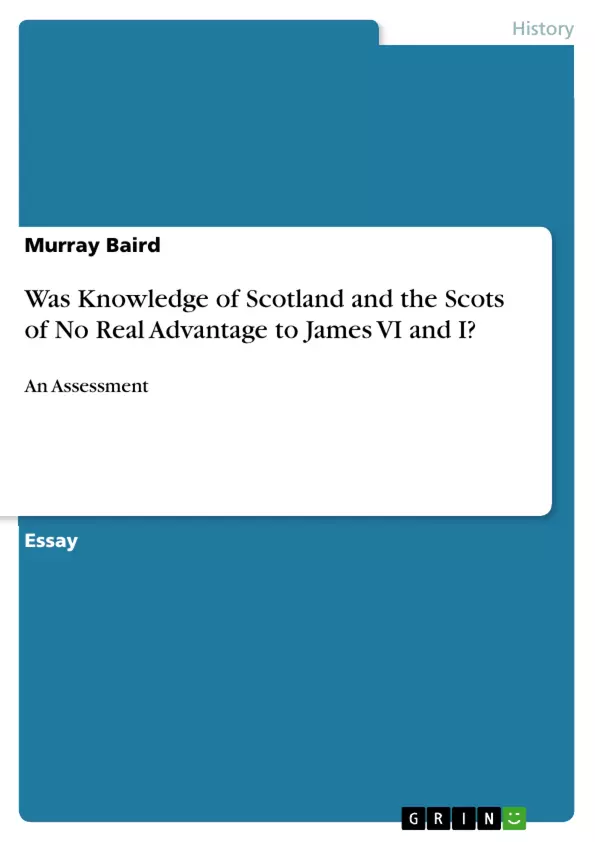James VI and I’s knowledge of Scotland and the Scots was gained from his training for kingship, the turbulent circumstances of his minority and from the experiences of his predecessors, as this essay shows. Any discussion as to whether this knowledge was of real, as opposed to perceived, advantage to James must be examined in light of his beliefs, aims and aspirations relating to kingship, including the divine right of kings and absolutist tendencies.
Inherent to the discussion are James’s dealings with the nobility in Scotland and in both Scotland and England after 1603. Problems of the lawlessness of the Borders and Highlands, together with James’s religious policies in both Scotland and England will also be examined. Following the Regal Union, knowledge of Scotland and the Scots will be further examined relative to his desire for a perfect union between Scotland and England, his government of Scotland as an absentee monarch and the challenges created by ruling two kingdoms with contrasting parliaments, courts and religious views. An assessment of any real advantage gained will be made considering how successful James was in achieving his goals.
Inhaltsverzeichnis (Table of Contents)
- James VI and I's Knowledge of Scotland and the Scots
- James's Kingship Beliefs
- James's Relationship with the Scottish Aristocracy
- The Regal Union of 1603
Zielsetzung und Themenschwerpunkte (Objectives and Key Themes)
This text examines the impact of James VI and I's knowledge of Scotland and the Scots on his kingship. It explores how this knowledge shaped his beliefs, aims, and aspirations, particularly in relation to the divine right of kings and absolutist tendencies. The text also analyzes James's dealings with the nobility in both Scotland and England, his religious policies, and his efforts to achieve a perfect union between the two kingdoms.
- James VI and I's knowledge of Scotland and the Scots
- James's kingship beliefs and their impact on his policies
- The role of the Scottish aristocracy in James's reign
- The challenges of ruling two kingdoms with contrasting parliaments, courts, and religious views
- The impact of the Regal Union on James's relationship with Scotland and England
Zusammenfassung der Kapitel (Chapter Summaries)
James VI and I's Knowledge of Scotland and the Scots
This chapter discusses the sources of James's knowledge of Scotland and the Scots, including his education, his experiences during his minority, and the experiences of his predecessors. The chapter highlights the influence of George Buchanan's theory of a monarch accountable to his people, as well as the traditional kingship beliefs of his ancestors. It also explores the importance of James's understanding of the Scottish aristocracy and the need to manage their power without alienating them.
James's Kingship Beliefs
This chapter examines James's kingship beliefs and their relationship to the doctrine of two kingdoms, which posited a separation between spiritual and temporal authority. The chapter argues that James's teachings on divine-right monarchy were intended to counter this doctrine and protect the Stuart dynasty from the influence of Scottish Presbyterianism. It also analyzes James's approach to dealing with the nobility, emphasizing his preference for traditional kingship values and his commitment to managing the aristocracy without resorting to despotic measures.
James's Relationship with the Scottish Aristocracy
This chapter explores James's relationship with the Scottish aristocracy, focusing on his ability to manage their power without domination. The chapter examines how James used his knowledge of the nobility to balance factional power, create counter balances to magnate power, and reward loyalty. It also discusses James's use of the Presbyterian Kirk to influence the behavior of the nobility.
The Regal Union of 1603
This chapter focuses on the challenges James faced in ruling both Scotland and England after the Regal Union. It analyzes the friction that arose between James and the English aristocracy, highlighting how James's reliance on Scottish courtiers alienated English nobles. The chapter also explores the reasons why James's desire to create a British aristocracy failed, including the Scottish nobility's reluctance to subordinate their Scottish interests to a British court.
Schlüsselwörter (Keywords)
This text focuses on the reign of James VI and I of Scotland and England, exploring his knowledge of Scotland and the Scots, his kingship beliefs, his relationship with the aristocracy, and the challenges of governing two kingdoms with contrasting political and religious systems. Key themes include the divine right of kings, absolutism, the doctrine of two kingdoms, the Scottish aristocracy, the Regal Union, and the relationship between Scotland and England.
Frequently Asked Questions
How did James VI and I gain his knowledge of Scotland?
His knowledge was gained through his rigorous training for kingship, the turbulent experiences of his minority in Scotland, and the history of his predecessors.
What was James's belief regarding the "Divine Right of Kings"?
James believed that monarchs derived their authority directly from God, a doctrine he used to counter theories of accountability to the people or the church.
How did the Regal Union of 1603 change his kingship?
After 1603, James became an absentee monarch in Scotland, facing the challenge of ruling two kingdoms with very different legal, religious, and parliamentary systems.
What was the "Doctrine of Two Kingdoms"?
It was a Scottish Presbyterian belief in the separation of spiritual and temporal authority, which James actively opposed to protect the Stuart dynasty's power.
Why did James struggle with the English aristocracy?
His heavy reliance on Scottish courtiers in England alienated English nobles, complicating his desire for a "perfect union" between the two nations.
- Quote paper
- Murray Baird (Author), 2006, Was Knowledge of Scotland and the Scots of No Real Advantage to James VI and I?, Munich, GRIN Verlag, https://www.grin.com/document/203293



